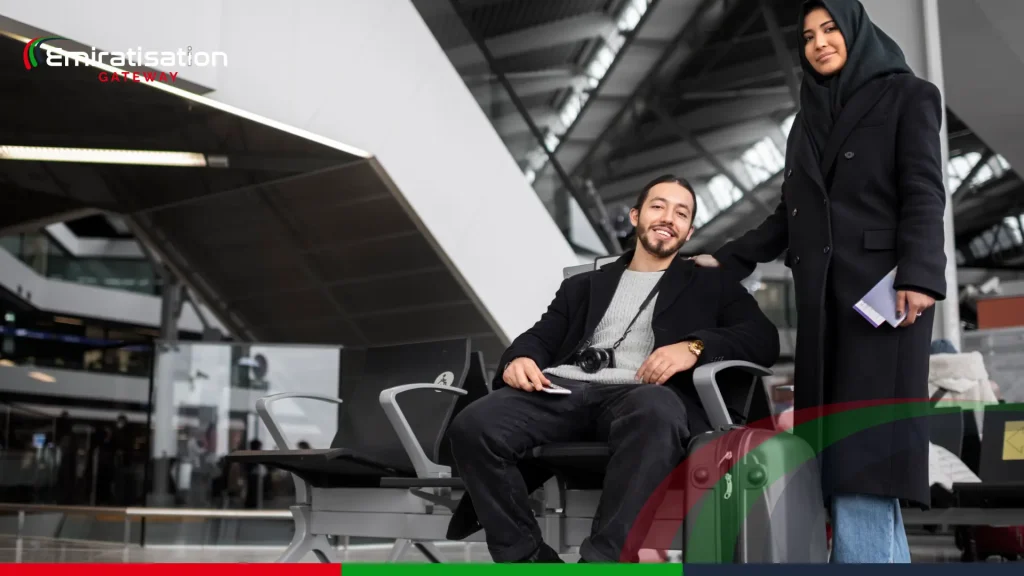The United Arab Emirates has become one of the most rapidly developing countries among all Gulf Countries. It is all because the UAE government is striving continuously to facilitate talent from all over the world as well as empowering UAE citizens through incredibly innovative policies and approaches. One of the futuristic and strategic approaches is the Emiratisation Rules.
The UAE government’s Emiratisation laws and rules are aimed at increasing the UAE national’s workforce in the public and private sectors both.
Through this innovative and strategic policy, the UAE government envisions economic diversification, reduces foreign labour dependency, and promotes a culture of inclusivity in the UAE’s job market. RAAD Recruitment‘s team has a deep understanding of Emiratisation rules in UAE, and we have decided to pass on our knowledge and expertise to businesses and employers as well as employees in the UAE to guide through this article.
Keep on reading to explore more about it:
Introduction To Emiratisation Rule?
The UAE government has initiated the Emiratisation Rule, especially for private sectors which ensures that UAE nationals or locals are provided with the chance to be a part of the workforce in corporates, industries, and organizations.
As part of Emiratisation, companies, especially in the private sector, must employ a certain number of Emiratis in their workforce.Let’s get a brief overview of it:
Overview of Emiratisation Policies and Regulations
- Emiratisation Rules demand all companies in the private sector that have a workforce ranging from 20 employees to 49 employees to hire at least one Emirati and the https://emiratisationgateway.com/ratio is to hire two emiratis in 2025.
- The UAE Emiratisation policy covers 14 key industries or sectors including Information Technology and Communication, Insurance and Finance, Healthcare and Real Estate among various other significant ones. It definitely has a great impact on the participation of Emirati individuals in the UAE economy.
- Companies will have to face penalties for non-compliance with Emiratisation rules. There may be hefty fines from AED 96,000 to AED 108,000.
- MOHRE (Ministry of Human Resources and Emiratisation) is responsible for monitoring through inspections to ensure compliance. The institution can also penalize non-compliance with fines.
- MOHRE has also facilitated employers and provided extended support through the platform of NAFIS which can be used for hiring and training the Emirati individuals.
Legal Framework of Emiratisation Rules
The legal framework of the Emiratisation Rules is based on the inclusion of a minimum of 2% Emirati Individuals of total skilled workers in all companies of the private sector per year. Simply a company with 50 skilled employees must hire at least one Emirati worker.
So what does Skilled Workers mean?
MOHRE defines Skilled Workers as
They should be working in any of the 5 categories below:
-
- Business executives, legislators, managers.
- Professionals in technology, science, or humanitarian fields.
- Technicians in technology, science, or humanitarian fields.
- Content writers, Copy Writers, Script Writer, Literature Writers, or Book Authors.
- Service, Sales and Marketing Individuals.
- They must be secondary school graduate with valid certificates, or their equivalent or higher.
- Have attested certificates with stamps from relevant authorities.
- Their monthly salary is AED 4,000 (no less than that).
Companies that fail to meet the Emiratisation targets may face penalties as follows:
- For the first time = AED 100,000 fine
- For the 2ndtime = AED 300,000
- For the third time = AED 500,000
Objectives of Emiratisation
The objectives of the Emiratisation Rules are to raise the Emirati individual’s participation in the workforce of UAE across all public and private sectors so that they contribute to the UAE’s economy significantly. It is because the UAE’s local nationals and businesses heavily rely on foreign professionals, skilled workers and labourers and the government envisions reducing this dependency.
Understanding the Goals and Objectives of Emiratisation Initiatives
- Emiratisation laws and rules mainly focus on utilizing the UAE’s human resources by empowering Emirati individuals through skills and knowledge.
- Emiratisation is all about developing local talent and letting their capabilities benefit the public and private most favourably by including more Emiratis within the business sector of the UAE.
- The UAE government is committed to providing extensive support to make Emiratisation initiatives effective by investing significant resources to achieve the strategic goals.
- Not only does the UAE government balance the hiring of UAE nationals and expatriates in businesses and companies in the UAE, but also aims to eliminate the reliance on foreign workforce, attain economic sustainability, and promote inclusivity.

Emiratisation Rules For Quotas and Targets
As we have discussed Emiratisation Rules are implemented by the Ministry of Human Resources and Emiratisation (MoHRE) and it has also set the targets and their implementation has been started.
Also, the Cabinet Decision has expanded the Emiratisation targets to 12,000 companies in 14 specific economic sectors with 20-49 skilled workers.
Let’s go through it briefly:
Overview of Emiratisation Quotas Set for Different Industries
According to the Emiratisation laws and rules since 2025 here is the overview of Emiratisation quotas set for different industries:
Listed companies in the private sector with 20-49 employees in their workforce must hire at least one Emirati.
If they fail to do so, they will be subjected to heavy fines starting from AED 96,000.
However, it can be paid in monthly instalments as of January 2025. Also,
The Emiratisation target is more from 2025 as these companies must hire two Emiratis from 2025 which is 2% of the Emirati’s annual growth in workforce.
Also, the UAE government aims to achieve the goal of integrating more than 75,000 Emirati citizens into the workforce of the private sector over the next 5 years.
Moreover, the private sector companies of 14 key industries that fall under Emiratisation rule UAE are:
- Information Technology.
- Communication.
- Insurance.
- Finance.
- Healthcare.
- Real Estate.
- Mining and Quarrying Industry.
- Manufacturing.
- Construction and architecture.
- Wholesale and retail trade.
- Transportation.
- Warehousing.
- Hospitality services.
- Education.
The list comprises of key industries that have to abide by the Emiratisation law to create job opportunities for Emirati individuals and contribute with a great impact on the UAE’s economy.
Recruitment and Hiring Practices
There are certain obligations towards employers in the UAE from MoHRE for recruitment and hiring under Emiratisation. Moreover, Emiratis are also obliged to report to MoHRE about any recruitment and hiring practices that violate the Emiratisation provisions.
Besides religiously following the Emiratisation Quota, some other practices for recruitment are:
- Employers must hire and train Emiratis to enable them to perform their responsibilities with utmost dedication.
- The workplace, working gear/tools/equipment and continuous workshops and training for skill development are mandatory.
- An employer must process the work permit for an Emirati employee from MoHRE.
- The employment contract must be signed by the employee.
- Stay compliant with the UAE’s Wages Protection System to pay the salary of hired Emiratis.
- Register the hired Emirati in the Pensions and Social Security System, and as soon as the work permit is issued, start contributing to it.
- Follow the NAFIS program to hire and train Emirati individuals and report immediately any kind of employment contract amendments that may not align with the eligibility criteria.
- An employer must process the cancellation of any previously mentioned work permits in case of employment termination.
- Employers must not make any salary deductions from the Emirati for benefiting from the support program.
Training and Development Opportunities
Well, Emiratisation rules are not limited to the inclusion of Emirati individuals in private sectors; the UAE government supports employers and employees equally through training and development opportunities.
The government realizes that how important training and skill development is to empower Emiratis for employment. That is why the UAE government launched the “Nafis” program and is investing substantially in educational initiatives, partnering with vocational training centres and even universities to make UAE nationals more competitive in the job market.
These programs launched under the Nafis scheme are as follows:
Talent Program: To train Emiratis and enhance their specialized competencies for professional certificates.
National Healthcare Program: Provides educational financial support to Emiratis to get qualifications in healthcare. It includes academic and specialized vocational programs within the fields of Healthcare, Medical, and Pharmaceutical Industries.
The Apprentice Program: Is a stipend-based 12-month training program in private companies and semi-government organizations to support the newly graduated Emiratis to develop their expertise in relevant fields.
Career Counselling: To guide and counsel Emiratis to discover their appropriate skills, and various opportunities, and carve their career paths. It includes the guidelines related to resume writing, interview basics, and workplace ethics.
Incentives and Support Programs
The UAE government promotes career advancement and skill development for Emiratis through the Nafis initiatives that include 4 specialized programs for the training and development of Emiratis.
Support for Emirati Employees to Enhance their Employability
The extensive support of the UAE government to implement Emiratisation rules also helps Emiratis enhance their employability in the private sector.
Emirati Salary Support Scheme:
The UAE government fully supports Emirati national’s salaries that are hired in the private sector under Emiratisation Rules
Unemployment Benefit:
Financial support is provided for all Emiratis in case they have lost their job for up to 6 months.
On Job Training:
All employers are bound to provide necessary on-the-job training to all Emiratis along with professional workshops.
Private Sector Worker’s Child Allowance Scheme:
Emirati employees working in the private sector will be provided with the government’s child allowance funding as well.
Pension Program:
Through a pension program, five-year government support is provided to Emirati employees. Through a rebate, along with support to employers of the private sector for the contribution to these funds.
Challenges To Emiratisation:
Although the vision of the UAE’s government to increase Emirati participation in the country’s workforce is fully funded, well-planned, and strategic, it has several challenges in its way.
Let’s discuss the significant challenges that hinder the implementation of Emiratisation rules:
Skills Gap:
The skills mismatch between the existing industry requirements and Emirati individuals seeking jobs is the biggest challenge. As the nation has been relying on the foreign workforce (employees, workers, labourers), the local residents of the UAE are not skilled enough to compete with those experienced individuals.
Although the UAE government has launched several programs for training and development to fill the gap. It will take a bit more time for Emiratis to acquire specific knowledge, specialized industry skills, and practical experience.
Salary Expectations and Career Progression:
Emiratis are prone to a luxurious lifestyle and that is why their salary expectations are higher than their level of education, work and professional experience, and the job market. However, some industries and companies may offer higher salaries; some may not afford to do so. This leads Emiratis to be reluctant to pursue their careers in the private sector.
Cultural Adaptation:
With more and more Emiratis joining the private sector for employment, the need to create an environment that is inclusive, and have Emirati values, customs and traditions has emerged. Also, companies have to take the initiative for the collaboration of Emirati and foreign employees which requires tremendous effort.
It not only leads to restructuring the existing company policies. It also increases the chances for friction between employers and employees.
Conclusion
Let’s wrap up this guide on Emiratisation Rules that are changing the employment practices in the United Arab Emirates. As New Policies under Emiratisation laws and rules are being implemented by the UAE’s government in 2025. Companies and organizations in private sectors are embracing the changes and helping the UAE to achieve the goals they have in mind.
If you want to get more useful insights on Emiratisation in UAE or relevant topics, read our articles that will help you out. Also, Emiratisation Gateway‘s team is always on its toes to help you with any concerns you have regarding Emiratisation Rule 2025.
FAQs
Q1. What is the new Emiratisation rule in the UAE?
Private companies with 50+ employees must increase their Emirati workforce by 1% every six months, aiming for 2% annually.
Q2. What is the target of private sector Emiratisation in the UAE?
The goal is to achieve 10% Emiratisation in skilled jobs by the end of 2026.
Q3. How many days of maternity leave are granted in the UAE private sector?
Female employees are entitled to 60 days of maternity leave—45 paid fully, 15 at half pay.
Q4. What is the penalty for fake Emiratisation in the UAE?
Companies face fines starting from AED 20,000 per case for misusing Emiratisation benefits.
Q5. Are small businesses exempt from Emiratisation rules?
Yes, companies with fewer than 50 employees are currently exempt from mandatory Emiratisation targets.






